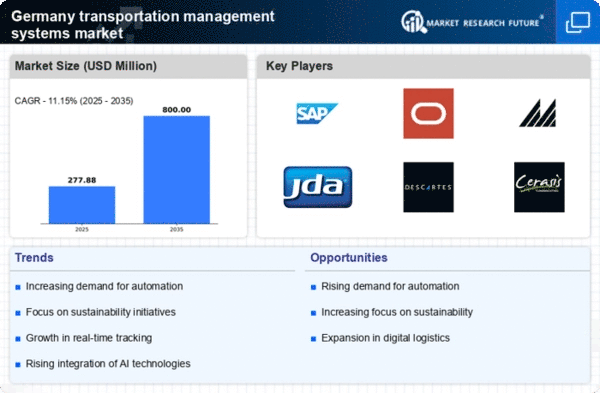Rising E-commerce Demand
The surge in e-commerce activities in Germany is driving the transportation management-systems market. As online shopping continues to gain traction, logistics and supply chain efficiency become paramount. Companies are increasingly adopting transportation management systems to streamline their operations, reduce costs, and enhance customer satisfaction. In 2025, the e-commerce sector in Germany is projected to reach approximately €100 billion, necessitating robust transportation solutions. This growth compels businesses to invest in advanced systems that can handle increased shipment volumes and optimize delivery routes. Consequently, the demand for transportation management systems is likely to rise, as organizations seek to improve their logistics capabilities and respond to the evolving market landscape.
Advancements in Data Analytics
The integration of advanced data analytics into transportation management systems is reshaping the market in Germany. Companies are increasingly leveraging big data to gain insights into their logistics operations, enabling better decision-making and strategic planning. By utilizing predictive analytics, organizations can forecast demand, optimize inventory levels, and enhance route planning. This trend is particularly relevant as the transportation management-systems market evolves, with an estimated growth rate of 15% annually. The ability to analyze vast amounts of data allows businesses to identify inefficiencies and implement corrective measures, thereby improving their competitive edge in the market.
Growing Demand for Real-time Visibility
Real-time visibility in supply chain operations is becoming a crucial requirement for businesses in Germany. The transportation management-systems market is responding to this demand by offering solutions that provide end-to-end visibility of shipments. Companies are increasingly seeking systems that enable them to track their goods in transit, monitor delivery times, and manage exceptions effectively. This trend is driven by customer expectations for transparency and timely updates. As a result, the market for transportation management systems is likely to expand, with organizations prioritizing solutions that enhance visibility and improve customer service.
Increased Focus on Operational Efficiency
In the competitive landscape of the transportation management-systems market, operational efficiency emerges as a critical driver. Companies in Germany are under constant pressure to minimize costs while maximizing service quality. Transportation management systems provide tools for route optimization, load planning, and real-time tracking, which can lead to substantial cost savings. Research indicates that organizations utilizing these systems can achieve up to a 20% reduction in transportation costs. As businesses strive to enhance their operational performance, the adoption of transportation management systems is expected to grow, enabling them to respond swiftly to market demands and improve overall productivity.
Regulatory Compliance and Safety Standards
The transportation management-systems market in Germany is significantly influenced by regulatory compliance and safety standards. As the government implements stricter regulations regarding transportation safety and environmental impact, companies are compelled to adopt systems that ensure adherence to these requirements. Transportation management systems facilitate compliance by providing tools for documentation, reporting, and monitoring. This is particularly relevant in light of the European Union's initiatives aimed at reducing carbon emissions in logistics. Consequently, businesses are increasingly investing in transportation management systems to navigate the complex regulatory landscape and maintain operational integrity.
















